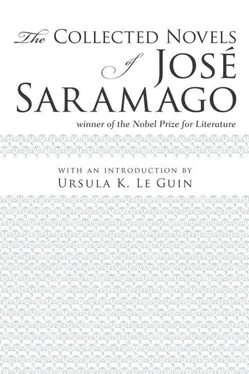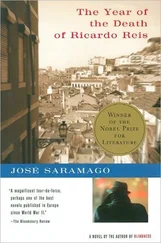WHEN THIS WAR ENDS, AND IT WILL NOT BE LONG NOW, for as we can see it is already almost over, there will be a final reckoning of those who lost their lives, so many here, so many there, some near, some farther away, and if it is true that with the passage of time the number of those killed in ambushes or open warfare loses all importance and is forgotten, those crucified, who number around two thousand, according to the most reliable statistics, will long be remembered by the people of Judaea and Galilee, even after more wars have broken out and more blood has been spilled. Two thousand crucified is a lot, but it seems even more if we imagine them set out a mile apart along a highway or encircling, for example, the country that one day will be known as Portugal, which has a perimeter more or less that length. Between the river Jordan and the sea, widows and orphans weep, an ancient custom, that is why they are widows and orphans, so that they may weep, and when the boys grow up and go to fight a new war, there will be more widows and orphans to take their place, and even if customs change, if black becomes the color of mourning instead of white, or if women wear black mantillas instead of tearing their hair out, tears of sincere grief will never change.
So far Mary is not weeping, but in her soul she has a presentiment, for her husband has not returned, and in Nazareth it is rumored that Sepphoris was burned and men were crucified. Accompanied by her eldest son, she retraces the route taken by Joseph yesterday. Very likely, at one point or other, her feet will touch the footprints left by her husband’s sandals, for this is not the rainy season and there is nothing but the gentlest breeze to disturb the soil. Joseph’s footprints are like the prints of a prehistoric animal that inhabited these parts in some bygone age, for we say, Only yesterday, and we might as well say, A thousand years ago, because time is not a rope one can measure from knot to knot, time is a pitched and undulating surface which only memory can make accessible. A group of villagers from Nazareth accompany Mary and Jesus, some moved by compassion, others simply curious, and there are distant relatives of Ananias, but they will return home as uncertain as they left, for since they have not found a body, he may still be alive. It never occurred to them to search the debris of the storehouse, where they might have recognized his body among the charred remains. These Nazarenes had gone half the way, when they met a detachment of soldiers that had been sent to search their village, so some turned back, worried about what might happen to their property, for one can never predict what soldiers will do when they knock on a door and find no one at home. The officer in charge asked why these villagers were on their way to Sepphoris, and they replied, We wanted to see the fire, an explanation which the officer accepted, because fires have had an irresistible attraction for mankind since the world began, there are even those who say that fire is a kind of inner call, an instinctive memory of the original fire, as if ashes somehow preserve what was burned, thus explaining, by this theory, the look of fascination in our faces as we watch a camp fire or the flickering of a candle in a dark room. If we humans were as foolhardy or daring as butterflies, moths, and other winged insects, and threw ourselves, all together, into the flames, then who knows, perhaps the blaze would be so fierce and the light so strong that God would open His eyes and be roused from His torpor, too late, of course, to recognize us, but in time to see the impending void after we went up in smoke.
Although she had left behind a house full of children with no one to look after them, Mary refused to turn back, and she was easy in her mind, because it is not every day that soldiers invade a village and start slaughtering young children. Besides, these Romans were not only willing but even eager to see the children grow up, provided they remained servile and paid their taxes on time. Mother and son are walking along the road by themselves, because Ananias’s relatives, some half dozen of them, are so busy chatting that they have fallen behind. Mary and Jesus have only words of anguish to exchange and so prefer to remain silent rather than distress each other. A strange silence hangs everywhere, no birds are singing, the wind has died down, there is nothing but the sound of footsteps, and even that withdraws, like a polite intruder who has entered an empty house by mistake. Sepphoris comes into sight suddenly as they turn a bend in the road. Several houses are still burning, thin columns of smoke rise here and there, walls are blackened, trees scorched from top to bottom, the foliage intact but the color of rust. And there on our right, the rows of crosses.
Mary started running, but they were still some distance away and she had to slow down and catch her breath. As a result of giving birth to all those children without letup, her heart is weaker. Jesus, a respectful son, would like to accompany his mother, remaining at her side, now and later, so that they can share the same joys and sorrows, but she walks so slowly, dragging her feet, At this rate, Mother, we’ll never get there. She makes a gesture as if to say, You go ahead and I’ll catch up. Leaving the road, Jesus sprints across the field to save time, Father, Father, he calls, hoping that his father will not be there, fearing that he will find him. He reaches the first row, some of the crucified men are still hanging from the crosses, others have already been taken down and lie waiting on the ground. Few have relatives to gather around them, for most of these rebels came from afar, part of a mixed contingent which made its last united assault and is now finally dispersed, each man left to confront alone the ineffable solitude of death. Jesus does not see his father, his heart would rejoice but his reason tells him, Wait, we haven’t got to the end of the row. But in fact the end is right here. Stretched out on the ground is the father he has been seeking, there is little blood, only the open wounds on the wrists and feet, You could be sleeping, Father, but no, you are not asleep, how could you possibly sleep with your legs twisted in that position, how charitable of them to remove you from the cross, but there are so many bodies here that the good souls who removed you had no time to straighten your broken bones. The boy named Jesus kneels beside his dead father and weeps, he cannot bring himself to touch the corpse, but then grief overcomes his fear and he embraces the motionless body. Father, Father, he sobs aloud, and another cry accompanies his, What have they done to you, Joseph, it is the voice of Mary, who has arrived at last, exhausted and sobbing her heart out, for when she saw her son come to a halt in the distance, she knew what to expect. Mary’s tears overflow when she sees the pitiful state of her husband’s legs. We do not know what happens to life’s sorrows after death, especially those last moments of suffering, it is possible that everything ends with death, but we cannot be certain that the memory of suffering does not linger at least for several hours in this body we describe as dead, nor can we rule out the possibility that matter uses putrefaction as a last resort to rid itself of the suffering. With a tenderness she would never have permitted herself to show while her husband was alive, Mary pulled down Joseph’s tunic after trying to straighten the broken legs that gave him the grotesque appearance of a puppet coming apart. Jesus helped his mother pull the tunic down over the thin shinbones, perhaps the most vulnerable part of the human body and a painful reminder of our fragile state. The feet hung sideways, and flies, drawn by the smell of blood, kept swarming around the wounds inflicted by the nail. Joseph’s sandals had fallen to the ground beside the thick trunk of which he was the last fruit. Worn and covered with dust, they would have lain there forgotten if Jesus had not recovered them without thinking. As if obeying an order, and unnoticed by Mary, he tucked the sandals under his belt, a gesture of perfect symbolism, Joseph’s firstborn claiming his inheritance, for certain things begin as simply as this, and even today people say, In my father’s shoes I become a man.
Читать дальше












